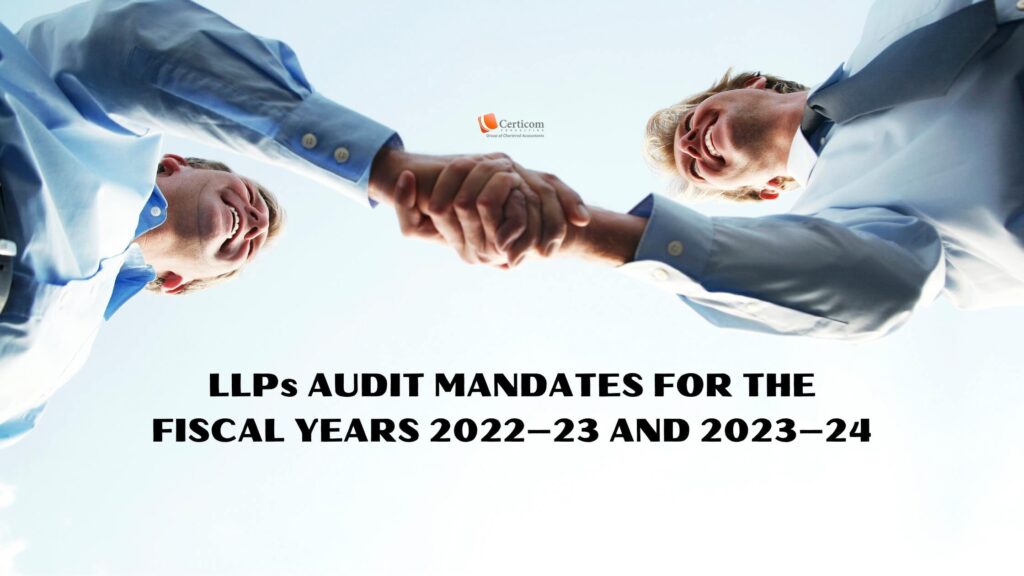LLPs AUDIT MANDATES FOR THE FISCAL YEARS 2022–23 AND 2023–24

Tax Audit by LLP
Objective
An LLP’s audit largely checks the completeness and quality of the financial and tax-related data disclosed in the LLP’s tax returns. Ensuring conformity with tax rules and regulations is the key goal.
Mandatory Prerequisite
The Income Tax Act of 1961 mandates that LLPs perform tax audits if certain conditions are met, including exceeding a predetermined turnover threshold. LLPs that meet these requirements are required to undergo the tax audit.
Carried out by
A competent chartered accountant or tax expert often conducts a tax audit, which involves reviewing the LLP’s financial documents and tax reports to determine its taxable revenue and spot any inconsistencies.
Report
A tax audit report, also known as Form 3CD, is produced by the auditor at the conclusion of the audit and includes numerous details on the audit’s findings, tax compliance, and other pertinent information.

LLPs Audit
Objective
For the purpose of determining accuracy, fairness, and compliance with statutory obligations, a statutory audit of an LLP entails a more thorough investigation of its financial statements and accounting records.
Essential Requirement
According to the Limited Liability Partnership Act of 2008 and its implementing Rules, LLPs must perform statutory audits. No matter how much business they do, LLPs must participate in a statutory audit.
Carried out by
The LLP’s partners employ an independent certified chartered accountantto undertake a statutory audit. To give an unbiased evaluation, the auditor’s independence is crucial.
Report
The auditor delivers a Statutory Audit Report following the completion of the statutory audit, which contains an opinion on whether the financial statements provide a true and fair assessment of the LLP’s financial situation and if they are in compliance with applicable laws and accounting standards.
Professionals
A tax audit is necessary if a professional’s gross receipts are greater than Rs. 50 lakhs. A tax audit is necessary if a professional asserts a profit that is lower than the allowed threshold and is eligible for the presumptive taxation plan under Section 44ADA.
Penalty for Noncompliance with Tax Audit
A penalty of 0.5% of the total sales, turnover, or gross revenues, or Rs. 1,50,000, whichever is less, would be assessed if a tax audit is applicable and the assessee fails to have their accounts audited.
Penalty for Noncompliance with Tax Audit
A penalty of 0.5% of the total sales, turnover, or gross revenues, or Rs. 1,50,000, whichever is less, would be assessed if a tax audit is applicable and the assessee fails to have their accounts audited.
Income Tax Return Filing Deadlines for LLPs (FY 2022-23)
LLPs must submit their income tax returns by July 31st even if a tax audit is not necessary. LLPs needing a tax audit are required to submit their income tax returns by September 30. – Even LLPs that did not conduct any activity during the financial year are required to file Nil Income Tax Returns.
Examples of the requirements for LLP audits
Demands for LLP Financial Audits
According to the LLP Act and Income Tax Act, XYZ LLP must have its financial records audited if it earned yearly revenues of Rs. 45 lakhs in the prior fiscal year.
Application of Tax Audits for AY 2023–24
Business Example
ABC Enterprises would not need a tax audit if they had a turnover of Rs. 1.2 crores in the assessment year 2023–2024 and their cash transactions made up less than 5% of the total. Regardless of the percentage of cash transactions, they would need a tax examination if their revenue exceeded Rs. 10 crores.
Professional Example
During the assessment year, Dr. Smith, a physician, made gross receipts of Rs. 60 lakhs. Dr. Smith would need a tax audit in this situation because their professional gross receipts surpassed Rs. 50 lakhs.

Penalty for Failure to Comply with Tax Audit
Imagine that XYZ Traders, a partnership firm, was qualified for a tax audit but chose not to have their books examined. If their annual sales totaled Rs. 2 crores, they would be subject to a fine of 0.5% of Rs. 2 crores, or Rs. 1,00,000, because this sum is less than the Rs. 1,50,000 minimum penalty threshold.
Read More: The Top 10 Red Flags for a Tax Audit
Deadlines for LLPs to file their income tax returns (FY 2022-23)
1. DEF LLP must submit their income tax returns by July 31st even if they did not need a tax audit for the fiscal year 2022–2023 (if required).
2. On the other hand, GHI LLP would have to submit their income tax returns by September 30th if they were subject to a tax audit for the same fiscal year.
3. JKL LLP must still submit Nil Income Tax Returns even if they had no commercial activity throughout the fiscal year.
Related Post
Resident’s Guide to Buying NRI Property in India
Flipkart ESOP Compensation: ₹11 Crore Payout – Salary or Capital Receipt?
Form 16: Key to Accurate ITR Filing
Book A One To One Consultation Now For FREE
How can we help? *







